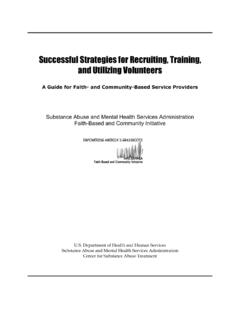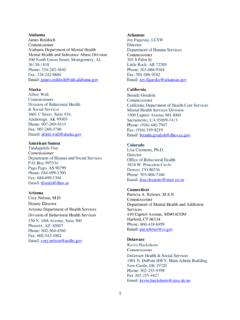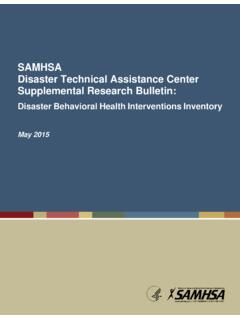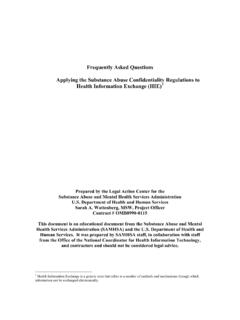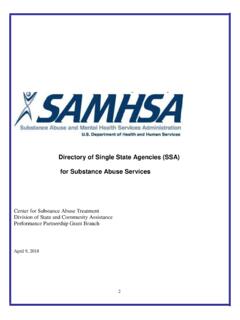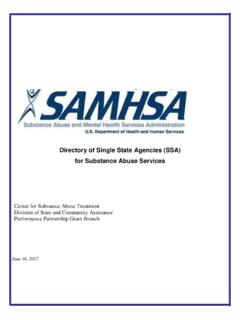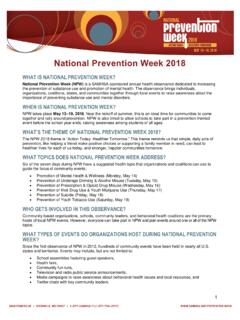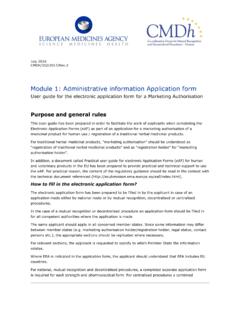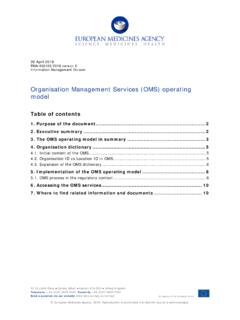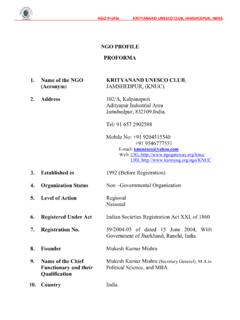Transcription of Supervision of Peer Workers - SAMHSA
1 Supervisi on of Peer WorkersBri nging R ecovery Support s t o S cale Technical Assistance Center StrategyThis presentation was supported by contract number HHSS2832012000351/HHSS28342002T from the Substance Abuse and Mental Health Services Administration ( SAMHSA ). The views, opinions, and content of this presentation are those of the presenters and do not necessarily reflect the views, opinions, or policies of SAMHSA or the Department of Health and Human Services (HHS). Learning Goals1 Describe the essential functions of supervisors2 Understand the principles and practices of peer support services3 Explore the application of recovery- oriented approaches to the Supervision of peer workers4 Learn two critical Supervision skills5 Access additional resources to improve your competence in supervising peer workersSupervisi onSupervisi on.
2 Defini ti onis a professional and collaborative activi ty between a supervisor and a worker in whi ch the supervisor provides guidance and support t o the worker to promote competent and ethi cal delivery of services and supports through the continuing development of the worker's application of accepted professional peer work knowledge, skill s, and on The most important t hing about Supervision is that it happens Supervision should be a priority for early - career peer Workers All Workers need access to Supervision Supervision is an investment Supervision benefit s employees, employers and service recipientsWhy Focus on the Supervision of Peer Workers ? Peer Workers fill relatively new and unique roles in the behavioral health care system and supervisors may not understand peer support w ill enough to provide high quality Supervision and the organizat ion may not be aligned wit h recovery - oriented values Leaders in peer - run/recovery community organizat ions may not have experience wit h Supervision and may not have organizat ional structures that support t he activity of Supervision Providing Supervision promotes good ethical practices Supervisors play a key role in the successful integration of peer Workers in the work placeChallenges to Supervising Peer Workers - for Non- Peer Supervisors Supervisors may lack experienceand working knowledge of peerpractice Supervisor may have a clinicalapproach to
3 Service provisi on Lack of knowledge among non-peer staf f about peer roles andpractice Organizat ions may not be alignedwith recovery - oriented values,practices, and culture Challenges in int egrating peerworkers and recovery values in atreatment set tingChallenges to Supervising Peer Workers - for Peer Supervisors M ay lack training andexperience wit h Supervision Lack of knowledge among non-peer staf f about peer roles andpractice Organizations not aligned wit hrecovery - oriented values,practices, and culture Peer - run/Recovery CommunityOrganizations may not have aculture of accountabilityBenefit s of Supervisi on for Peer Workers Provides opportunities to reflecton peer support practice Delivers better outcomes throughlearning that comes fromexploring and discussing workissues Enhances problem solving skills Improves clarity and objectivity indecision making Supervision empowers.
4 Motivatesand increases worker satisfactionBenefit s of Supervisi on for the Organizat ion Supervision is a tool that can be used to achieve the agency s mission and objectives Supervision improves performance and helps to manage resources The supervisor serves as the mediator and liaison between the agency and the worker Good Supervision can increase morale and improve retentionFunctions of t he SupervisorSupervision is comprised of 3 basic functions:AdministrativeEducativeSupport iveKadushin , A. (1992) Supervision in Social Work (3rd. edn .), New York: Columbia University Press. Revised fourth edition published 2002 Administ rative Supervisi onAdministrativeAdministrative Supervision tasks focus on the effective implementat ion of t he agency s policies and procedures and the management of t he peer worker s work performance.
5 Quality of w ork Work load Liaison to operations - payroll, human resources Using program resources, including time, effectively Conformance or fidelity to the program model Record keepingAdministrativeEducative Supervisi onEducativeEducative Supervision tasks focus on the professional development of t he worker though training, modeling and structuring learning experiences. Provide time and space to reflect on peer practice Focus on knowledge, skills and attit udes Provide individualized training and support Provide venue for supporting the peer worker s professional developmentEducativeSupportive Supervisi onSupportiveSupportive Supervision tasks focus on the person s morale and job satisfaction. Give feedback on work Discuss personal reactions to the work Validate and provide encouragement Promote self - care practices Advocate for peer support roles SupportiveFundamental s f or Supervisors of Peer WorkersSupervisors Understand Peer Roles and Practices Supervisors understand the variety of peer roles Supervisors have a deep understanding of t he core competencies of peer Workers Supervisors understand the specific peer support j ob of t he person they supervise Supervisors can learn more about t he fundamentals of peer support and peer roles by.
6 Participating in trainings designed for peer support w orkers Reading articles about peer - delivered recovery support services Learning the core competencies of peer workersSupervisors Have a Recovery Ori entat ion and Model R ecovery - oriented Practices Supervisors endorse and enact recovery - oriented practices and values Supervisors believe in the capacity of peer Workers to grow and develop professionally Supervisors frame difficulties as learning opportunities and st ructure learning opportunities to help the worker grow Supervisors support t he development of individualized professional goals Supervisors support t he integration of peer Workers and recovery valuesExamples of Recovery- oriented Values Hope - inspiring the growth potential in all Person - centered - based on the individual s aspirations St rength - based - focused on the unique gifts of each worker Personal responsibility - holding people accountable for their commitments Interdependence - a balance between team work, autonomy, and mutual support Supervisors model these values in their work Agencies operationalize these values in their policies, procedures, and practicesSupervisors Support t he Development of t he Unique Knowledge and Skills Needed for Peer Support Practice Supervisors teach Workers the knowledge and skills they need to perform work tasks Supervisors evaluate work performance through direct observation, co - working, assessments, and reflection.
7 All in collaboration wit h the peer worker Supervisors structure learning opportunities to help Workers grow Supervisors advocate for worker s participation in on-going trainingSupervisors Recognize the Connections between Behavioral Health Conditions and Trauma, Health Disparities, and Social Inequity Supervisors take a holistic view of a person, that t hey are more than their diagnosis or addiction Supervisors recognize that recovery involves more than symptom reduction or abstinence Supervisors recognize the interconnected nature of social categorizat ions such as race, class, and gender as they apply to a given individual or group, regarded as creating overlapping and interdependent systems of discrimination or disadvantage Supervisors support w orkers to address issues of poverty, trauma and discriminationSupervisors Use Strengths - based SupervisionSt rengths - based Supervision is a collaborative process between the worker and supervisor enabling them to deliver quality services and supports that draws on the person s st rengths and assets Seek to discover and amplify the Workers strengths and competencies Intentionally identif y and amplify the Workers success Encourage learning and share responsibility for setting learning goalsSt rength- based Supervisi on Focusing on strengths does not mean ignoring problems.
8 But rather means that t he Supervision frames problems as learning opportunities Feedback and self-assessment are tools in st rengths - based supervisionSupervisors Provide a Space to Address Ethi cal and Boundary Issues M ost peer Workers have been trained about ethics and follow a Code of E thics that has been adopted by the stat e in which they work Supervisors review agency code of conduct w it h the people they supervise Peer Workers are expected to follow both their Code of Et hics and the agency s code of conduct The nature of peer support means that boundary issues can be very nuanced and may require opportunities to reflect wit h a more experienced colleagueSupervisors Advocate for the Integration of Peer Workers in the Work Place Supervisors educate others in the work force about t he peer support roles and practices Supervisors create opportunities for peer support w orkers to interact w it h other team members Supervisors work wit h leadership to create more optimal working conditions for peer workersSupervisi on FormatsSupervisi on FormatsIndividual supervisionGroup supervisionCo- supervisionIndivi dual S upervisi onAdvantages Exclusive attention to the worker Often experienced as safer by the worker M ore confidentialDi sadvantages Dependence can develop Exposure to only one perspective in Supervision Lost opportunity to learn from colleaguesGroup Supervisi onAdvantages M ore efficient t han individual Supervision Supervisees share information and may learn from each other Can be a powerful way
9 To reduce isolation and may foster group cohesivenessDi sadvantages Working in a group can be experienced as unsafe by some Workers It may difficult t o meet the specific needs of individual participants and there is a risk discussions remain generalized and do not meet anyone s needs in a satisfactory wayCo- supervisi on Co - Supervision is the provision of Supervision by more than one supervisor This model may be used when the organizat ion does not have supervisors who are peer support w orkers Peer Workers may benefit s from a second supervisor if t heir primary supervisor doesn t have the expertise to help them develop in their peer practice Often, one supervisor provides more administrative Supervision and the other provides more education. Ideally, both provide supportCo- supervisi onAdvantages Workers benefit f rom the guidance of more than one person Workers can develop their competencies wit h a skills peer support workerDi sadvantages Some agencies don t have the resources to offer co - Supervision There may be challenges in communication or disagreements between the co-supervisors Co - supervisors may not share the same expectat ionsSupervisi on Formats M any organizat ions offer multiple formats of Supervision to address different professional development needs Different w orkers get different learning needs addressed by different f ormats Organizations that lack supervisors who themselves are peer support w orkers sometimes make co - Supervision by an experienced peer support w orker
10 AvailableSel ected Competencies for Supervisors of Peer WorkersCompetencyCompetencies are the combination of observable and measurable knowledge, skills, and attit udes that contribute to enhanced performance and ultimately result in organizat ional At tit udesKnowledgeSkillsCore Belief s/ At tit udes for Supervisors of Peer WorkersBeliefs/ At tit udes Hope - belief in the possibility of recovery Person.
